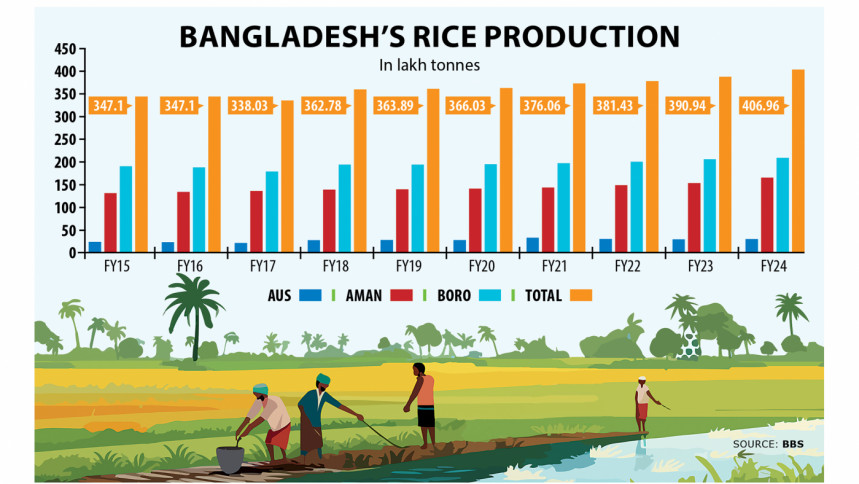Tags
Bangladesh’s rice output crosses 4cr tonnes for the first time

For the first time, Bangladesh has bagged more than 4 crore tonnes of rice in a fiscal year (FY) thanks to increasing yields of the most grown crop, according to official data.
Local farmers have been gradually switching to high-yielding and hybrid varieties of the cereal grain, bringing the country’s need for rice imports down to zero.
Estimates by the Bangladesh Bureau of Statistics (BBS) show that farmers bagged 4.06 crore tonnes of rice in FY 2023-24, up by 4.1 percent year-on-year in what was the highest growth in six years.
The largest growth in yields came from Aman paddy, which was harvested in the previous winter ahead of Boro paddy in the dry season. Boro is the principal rice crop in Bangladesh.
Farmers got about 2.10 crore tonnes of rice through the Boro harvest in the May-June period early this calendar year.
FY24 marked the fifth year of a consistent rise in rice production with Wais Kabir, a former executive chairman of the Bangladesh Agricultural Research Council, linking the spike to yield enhancement.
“One of the main factors is that farmers have shifted to cultivating modern varieties of rice. They are growing more high-yielding and hybrid varieties. The acreage has also risen over time,” he said.
Jahangir Alam, an agricultural economist, said increased rice production cut import of the cereal grain.
“We did not have to import any rice [in FY24]. Besides, this did not have much of an impact on prices as it seems public and private stocks were adequate,” Kabir added.
Data of the food ministry shows that Bangladesh imported 10.56 lakh tonnes of rice in FY23 compared to zero public and private imports as of October 7 this year.
Kabir also said one of the reasons behind the zero rice imports was a surge in wheat imports.
The use of wheat by bakery and food processing industries as well as animal feed has increased. This contributed to the reduced requirement for rice, he added.
Imports of wheat, the second most consumed cereal grain after rice, soared 71 percent year-on-year to 66 lakh tonnes in FY24.
M Asaduzzman, a professorial fellow at the Bangladesh Institute of Development Studies expressed doubt over the rice production estimate.
He questioned why prices have gone up if supply was indeed adequate.
“Production has not risen as much as reported. Higher prices mean there is a supply shortage,” he said, adding that rice accounts for a good portion of food inflation, which was high in the previous fiscal.
The BBS said food inflation rose to 10.65 percent in FY24 from 8.71 percent the year prior.
The price of rice coarse rice, the cheapest variety, was 7 percent higher year-on-year at Tk 50 to Tk 55 per kilogramme in Dhaka yesterday.
Asaduzzman informed that recurrent floods this year have raised concerns over the cultivation of Aman.
“We will have to import rice if Aman production suffers. And that will be clear at the beginning of November. So, the government should take a decision regarding imports next month,” he said.
By the end of August, the US Department of Agriculture (USDA) said Aus and Aman rice acreage and production in Bangladesh might decline because of the floods, particularly the devastating deluge in the eastern part of the country.
Estimates by the Department of Agricultural Extension show that Aman acreage declined to 57.35 lakh hectares this season from 35.5 lakh hectares previously.
Agricultural economist Alam said the overall Aman rice output may be 1.55 crore tonnes to 1.60 crore tonnes this year.
“Farmers had to transplant the seedlings late because of floods. This may cause lower yields,” he said while adding that imports might not be needed as stocks of the grains are favourable.
“But the next Boro rice crop is crucial,” he said. “We will not need to worry about food security of the staple grain if we can ensure production inputs, mainly fertiliser, at the doorsteps of farmers.”
Kabir said the ongoing flood in the Sherpur-Netrokona districts will damage the Aman crop in the fields and it cannot be recovered.
“So, whether we will need to import or not will depend on the next Aman harvest. And the output of the upcoming Boro would depend largely on the management of fertiliser by the government.”
“The interim government has to ensure proper management of fertiliser to ensure a good harvest of Boro rice,” he added.
https://www.thedailystar.net/business/news/some-rmg-work-orders-shifted-other-countries-unrest-3724246Published Date: October 10, 2024






